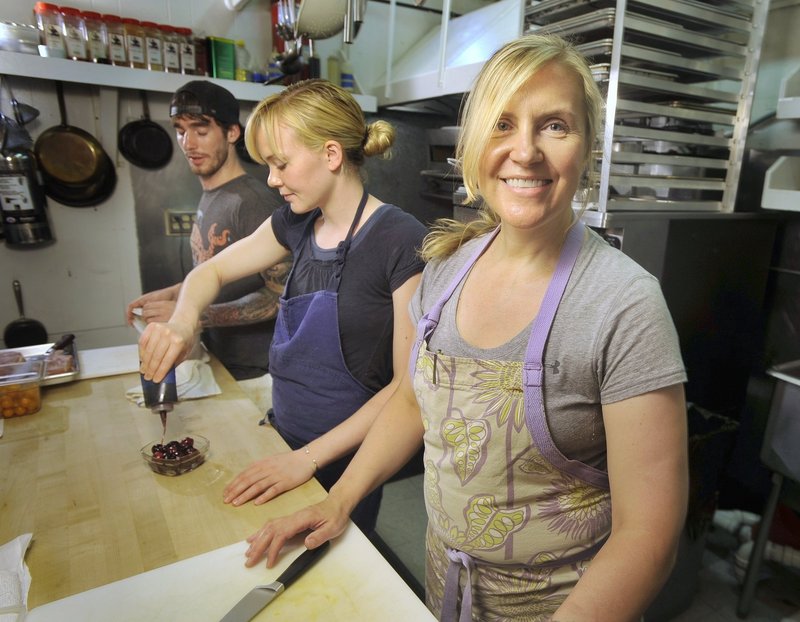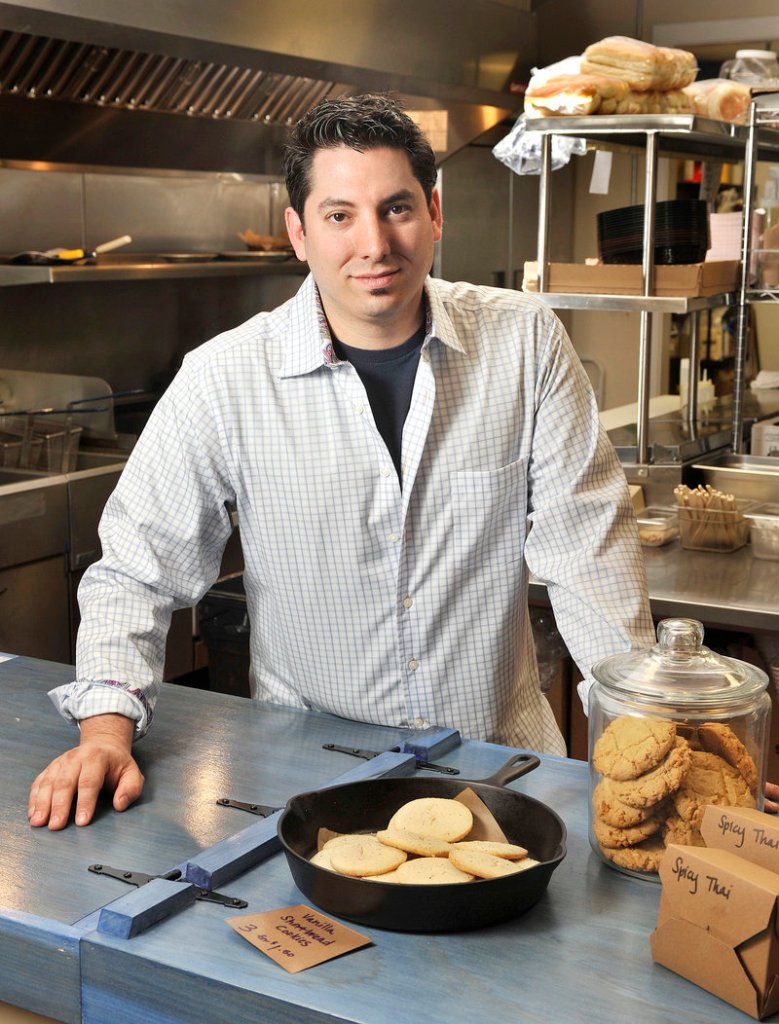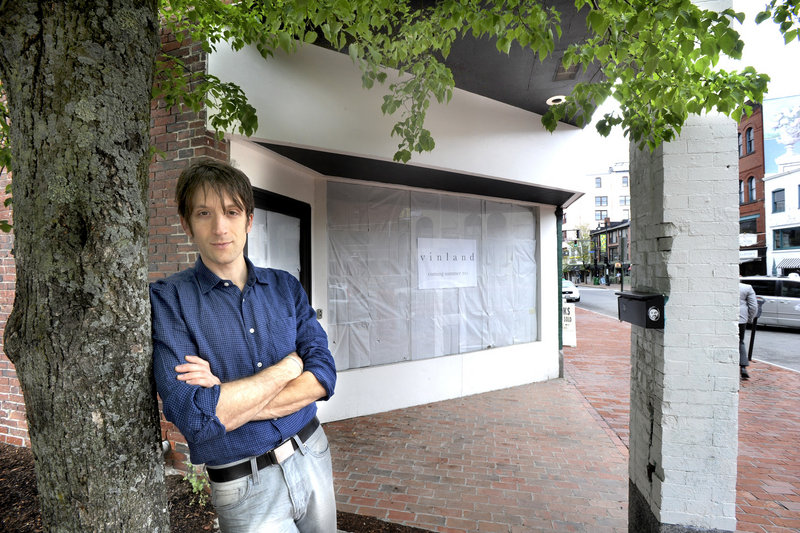• CHRIS GOULD
Back in Maine, the chef plans to create a dining spaceat 414 Fore St. in one of the city’s oldest buildings.
When the building at 414 Fore St. was built in 1828, the waters of the Fore River lapped at its door.
The red brick building, which is actually at the conjunction of Fore, Wharf and Dana streets, has barely been touched over the years, even surviving the Great Fire of 1866. Now the entire building is undergoing a major renovation.
“It’s one of the oldest buildings in Portland, and it’s never been remodeled,” said chef Chris Gould, who left the helm of Ken Oringer’s Uni Sashimi Bar in Boston last year to move back to Maine and open his own restaurant. “It’s all original from top to bottom.”
Gould and his wife, Paige, recently purchased the building, and plan to turn the first two floors into a cozy bar and restaurant that serves seasonally driven, tapas-style fare. The chef is designing the kitchen and floor layout himself.
The bar will be downstairs off the Wharf Street entrance and feature an L-shaped bar, a communal table and a standing-room-only drink rail area by the front window. A prep kitchen will be located in the back of the bar. The pumpkin pine floors in the bar area will be taken up to replace the joists and then relaid.
The restaurant entrance will be a level above, on Fore Street. It will have an open kitchen with seating at the bar, and 11 tables.
Altogether, the bar and restaurant will seat about 58. The two levels will be connected by an interior open stairwell. (The third and fourth floors are being turned into residential units.)
The Goulds will be installing early 19th century lighting in keeping with the historical character of the space, and the bar tops will be made of restored wood.
The couple is working with a blacksmith in Hope who is building all of the tables, chairs and barstools. Good Wood Tables in North Yarmouth is building all the furniture made with reclaimed wood — bar tops, table tops, drink rails and communal table.
Look for the restaurant to open in early to mid-September.
Krista Kern Desjarlais
The chef at the acclaimed Bresca restaurant in Portland has plans to open a snack shack in New Gloucester.
Bresca was still turning away reservations, and still getting rave reviews. Chef/owner Krista Kern Desjarlais was even a finalist for a James Beard award in 2011.
So why did Desjarlais decide to close the doors of the critically acclaimed little restaurant at 111 Middle St. in May?
She’s opening a summertime snack shack, Bresca and the Honeybee, at Outlet Beach on Sabbathday Lake in New Gloucester, the town where she lives with her husband and daughter.
This sweeping change was not just the whim of a bored chef. Everything that’s happened at Bresca in the past few months — scaling back dinners to two nights a week, starting a lunch service — was designed to help Desjarlais find some relief from her chronic migraines. It turns out that while she was creating those fine dining dishes Portlanders so enjoyed, she was often in massive pain.
Starting the popular lunch service at Bresca was an experiment to see if working daytime hours would help. It did.
“I’m starting to think I need to make decisions about my life and my health,” she said.
When Desjarlais saw the Outlet Beach property was for sale, it occurred to her that refurbishing its 1929 snack shack could be a step toward helping her shift out of night work.
“It’s seasonal, but maybe I could eventually turn it into a bakery,” she said. “The building’s a camp that I’d have to winterize over time, but there’s no bakeries in New Gloucester or Gray, and it’s a really family-orientated community.”
The chef isn’t ready to say that Bresca is over for good. She still holds the lease on the restaurant space, and if no one steps forward to take it over, she may have to rethink her situation come September.
But for now, Outlet Beach is open for boating and swimming, and Desjarlais hopes to start serving food by June 10.
In addition to hamburgers and hot dogs, the menu will include sandwiches, a garden salad, deviled eggs and homemade ice cream — all items from which people can build a picnic. Desjarlais promises that all of her food will still “have integrity” (she’s buying her ingredients from local farms, for example), and she will try to keep prices low so locals won’t get sticker shock.
“I believe in this life you have to take risks and continue the journey and just keep going,” she said. “Who knows what it will bring?”
Damian Sansonetti
The operator of the Blue Rooster Food Co. is planning to open a new restaurant called Sonnet.
Damian Sansonetti hasn’t exactly been twiddling his thumbs since he moved to Portland from New York City, where he worked for renowned chef Daniel Boulud for six years.
Upon landing in Maine, Sansonetti helped redesign the menu at Taco Escobarr, hosted a series of pop-up dinners and opened an over-the-top sandwich shop on Dana Street called Blue Rooster Food Co. that has things on the menu like “Farmers Breakfast Tots” — tater tots served with a fried local heritage duck egg, house-smoked bacon, pork heart pastrami and crispy pork skin.
There is more to come. Sansonetti is planning a new restaurant called Sonnet, which is both a play on his last name and a reflection of the concept of the restaurant. A sonnet is a 14-line poem, “so we may only offer 14 dishes — or 16 dishes, because there are 16-line sonnets.”
The chef said he doesn’t necessarily want the restaurant to be classified as fine dining, but he does want it to be a place where diners will be “pleasantly surprised” by the food, “kind of like what you get at Blue Rooster.”
“We’re not just a sandwich shop,” he said. “We’re something a little bit different in the way we pick the ingredients and source stuff and prepare things. We want it to be a relaxed atmosphere because we want everyone to come in.”
The food at his new restaurant will be Mediterranean in style, and it will be made with ingredients from Maine farms.
Now all Sansonetti needs is a location. He says he’s actively exploring a couple of spots, and hopes to have something open by fall.
• David Levi
Vinland will be a 100 percent local restaurant, which means that it will use only local foods.
Most chefs would consider olive oil, lemons and black pepper fairly essential ingredients.
When David Levi opens Vinland, his restaurant at 593 Congress St., at summer’s end, he won’t have any of these foods in his toolbox. Vinland will be a 100 percent local restaurant. That means when Levi needs acidity in a dish, he’ll use either Maine-made vinegar or condensed yogurt whey.
“If I cook it down, (yogurt whey) is as acidic as lemon juice, and it has a wonderful smooth flavor with a little sweetness to it,” Levi said.
Levi grew up in an Italian family in New York and came to food after years of teaching and writing poetry. One of the people he tutored along the way was Cedric Vongerichten, son of renowned chef Jean-Georges Vongerichten. The two struck up a friendship, and Vongerichten opened Levi’s eyes to what was possible with food. Levi’s interest in the culinary world dovetailed with his interest in ecology, and he began seeing how chefs could use ancient techniques like fermentation, dry aging, pickling and smoking to innovate “and make amazing food — food on the level of art that would be a moving experience and that would also be moving people in the direction of eating local, seasonal, sustainable food and wild foods that put them in touch with the land.”
Next came a series of stagiaires in New York and Italy, followed by two more at Noma in Copenhagen — considered one of the best restaurants in the world, and known for its use of local and wild foods — and F?ken Magasinet in Sweden, which has an even shorter growing season than Maine.
Levi will be incorporating a lot of what he learned at the restaurants in his new place. He believes that working within the boundaries of his pledge to use only 100 percent local foods will push him to innovate in the kitchen in ways he wouldn’t otherwise.
“The motivating principle is to do the most that I possibly can to help build the sustainable local food economy,” Levi said.
Send questions/comments to the editors.







Comments are no longer available on this story